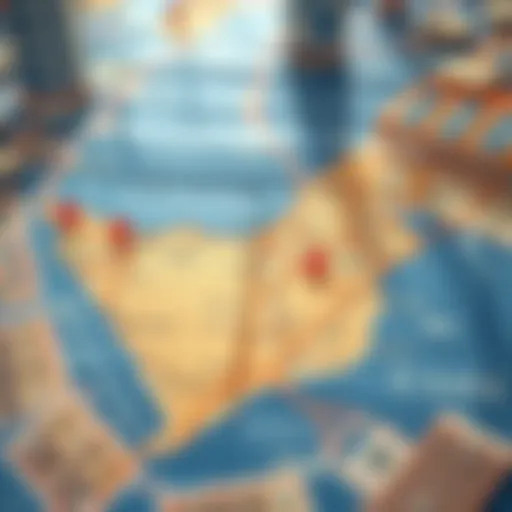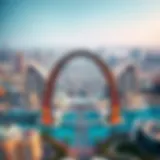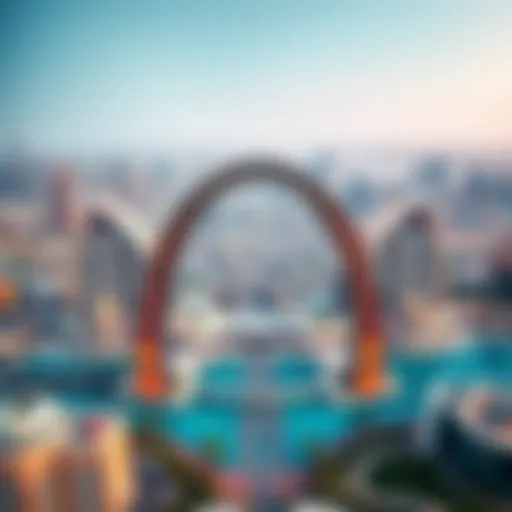Exploring the Global City Concept: A Focus on Dubai
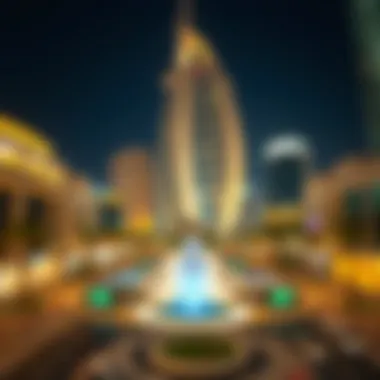

Intro
The modern urban landscape is marked by cities that serve as vital hubs of economic, cultural, and social activity. Among these, few stand out as definitively as Dubai. This city, rising dramatically from the Arabian sands, represents a synergy of tradition and modernity, encapsulated in its towering skyscrapers and bustling souks. In this article, we traverse through the global city concept, with Dhabi at the forefront.
Dubai is not just a place on the map; it’s a phenomenon—an exemplar of globalization that attracts investors and expats alike. Its trajectory is characterized by rapid development, strategic planning, and a vision that transcends borders. As we delve into the specifics, we will highlight key market trends, property investment insights, and uncover the layers that compose Dubai’s identity as a global city.
Join us as we unpack how this city has positioned itself amidst fierce competition in the global arena and what it means for investors and stakeholders navigating its complex landscape.
Defining Global Cities
In today's rapidly changing world, the concept of global cities has become increasingly significant, particularly when examining their role in economic growth, cultural exchange, and urban development. A global city is not just a hub for trade or finance; it serves as a focal point where local and international forces intertwine. As the article unfolds, it will draw attention to how these urban centers shape and influence the global landscape.
Historical Context
The historical underpinnings of global cities offer insight into their current status. Many of these urban giants, such as New York, London, and Tokyo, emerged through pivotal historical events. For example, London rose during the British Empire's expansion, while New York gained its status through waves of immigration and industrialization in the late 19th century. Understanding their history helps to grasp how certain cities transitioned from regional centers to international powerhouses. This transformation often stems from shifts in political landscapes, technological advancements, and economic strategies.
Key Characteristics
Economic Influence
One of the most prominent aspects of a global city is its economic influence. Global cities typically command a significant share of financial markets, attracting investment and talent. This is evident in cities like Hong Kong and Singapore, which serve as central nodes in finance and trade. Economic influence undoubtedly propels local development, making it a vital characteristic to consider. However, while this influence can accelerate growth, it can also yield disparities, as not all residents equally benefit from such economic booms.
Political Significance
Political significance is another defining quality, acting as a barometer for a city's global standing. Cities like Washington D.C. or Brussels play pivotal roles in international diplomacy, hosting organizations and government institutions that shape global policies. The political clout of a global city helps it gain leverage in international negotiations. However, this might result in an uneven focus on prestige rather than addressing local issues, making it a double-edged sword in the urban arena.
Cultural Impact
Cultural impact encapsulates the vibrancy and diversity of global cities. These urban spaces often become melting pots of different cultures, showcasing art, cuisine, and traditions from around the world. Cities like Paris and Tokyo are celebrated not just for their economic prowess but also for their cultural offerings that attract tourists and residents alike. The cultural scene not only enhances the city's brand but also fosters a sense of community and belonging. Nonetheless, cultural hegemony can emerge, sometimes overshadowing indigenous cultures and communities within these cities.
Globalization and Urban Development
Globalization connects cities on a scale never seen before. This interlinking drives urban development and redefines city planning. As global flows of people, goods, and information increase, cities adapt to become more livable, competitive, and sustainable. Emerging factors like technological innovation and environmental sustainability play crucial roles in shaping modern urban spaces.
In summary, understanding what defines global cities can provide a roadmap to appreciate their impact on the world. From their historical contexts to key characteristics, this framework will guide the exploration of Dubai as a quintessential global city.
Dubai: A Case Study of a Global City
Dubai stands tall as a prime example of a global city, illustrating how urban centers evolve within the fabric of globalization. This section explores the distinct characteristics of Dubai, scrutinizing its historical roots, economic development, and real estate dynamics. In detailing these elements, this article aims to clarify how Dubai has not only embraced global city status but has also redefined it in many respects.
Historical Background of Dubai
Origins and Development
Dubai's origins steep back to humble beginnings as a small fishing village in the early 18th century. The strategic location along trade routes soon sparked initial growth. What set the stage for Dubai's rise was not merely its location, but the visionary leadership that recognized its potential.
Key to the region's development was the discovery of oil in the 1960s. Oil revenues transformed the city from a simple port town into a booming metropolis. With significant investment in infrastructure, including airports and roads, Dubai became a nexus for trade and tourism.
The unique aspect of this transformation was the rapid urbanization that surpassed many contemporary cities. With a primary focus on creating a cosmopolitan environment, it attracted not just business, but people from different walks of life. This narrative of transformation not only adds to Dubai's allure, but also provides vital insights into the mechanisms driving global city dynamics.
Transformation Through Trade
The trade history of Dubai is rich and compelling. The emirate has long served as a commercial hub, leveraging its geographical advantages to establish itself as a central meeting point for goods, ideas, and cultures. This transformation was fueled by a mix of governmental policies and market-driven approaches, emphasizing its role as a free trade zone.
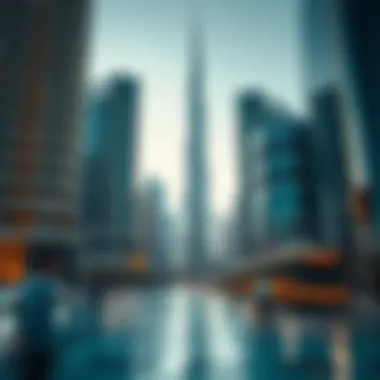

One of the key characteristics of Dubai's trade evolution is the establishment of the Jebel Ali Free Zone, which has attracted multinationals and startups alike. The unique feature here is the absence of corporate taxes for foreign companies, which provides a significant advantage in attracting foreign investment.
This open-door policy towards trade offers substantial benefits, though it also presents challenges, including potential over-reliance on external markets. Dubai's historical trajectory in trade is thus a vital aspect to grasping its identity as a global city, providing frameworks for understanding economic strategies employed in contemporary settings.
Economic Growth and Diversification
Dubai's economy has undergone a remarkable transformation from oil dependency to a diverse economic powerhouse. Since the last decades of the 20th century, efforts have been concentrated on broadening the economic base. These measures have fostered growth in sectors such as tourism, aviation, technology, and finance. This diversification has proven beneficial, creating resilience against market volatility, while simultaneously ensuring long-term economic sustainability.
According to recent studies, nearly 60% of Dubai's economy is now derived from non-oil sectors, a substantial shift that showcases strategic foresight. The emirate also ranks as a regional leader in financial services, a testament to its ambition to position itself as a major financial hub in the Middle East. The city's economy, thus, serves as a stellar example of strategic planning interwoven with dynamic market forces.
Real Estate Dynamics
The Emergence of Property Market
In the realm of real estate, Dubai is known for its ambitious property development, positioning itself at the forefront of international real estate markets. With projects like the Burj Khalifa and Palm Jumeirah, the emirate has captured global interests. The allure of high returns on investment has drawn eyes from around the world.
Key characteristics of this property market include a blend of luxury and affordability, appealing to a diverse range of investors. However, the emergence of such a market brings challenges, particularly in terms of oversupply and fluctuating prices.
The unique feature of this market's growth lies in its rapid development coupled with regulatory reforms that aim to protect investors. While the benefits of investing in Dubai's property market are undeniable, potential pitfalls require careful consideration from potential buyers and investors.
Luxury Developments
The luxury segment of Dubai's real estate landscape is dazzling. High-end projects like the One Za'abeel, boasting a private residential elevator, epitomize opulence and architectural innovation. This segment not only attracts wealthy individuals looking for lifestyle enhancements but also investors seeking high-value assets.
The benefits of investing in luxury properties are manifold; they offer high appreciation potential and enhanced rental yields. Nevertheless, with the premium price tags come economic fluctuations that can impact resale values. Thus, while luxury developments elevate Dubai's profile as a global city, they also necessitate careful navigation.
Affordable Housing Initiatives
Amidst the luxurious terrains, Dubai recognizes the importance of affordability in housing. Initiatives launched by the government aim to provide more accessible housing options for a growing expatriate population. Projects like Dubai South reflect a concerted effort in catering to middle-income residents.
Highlighting the importance of inclusive housing demonstrates a proactive approach to urban development in Dubai. The unique feature of these initiatives ensures that the city remains livable for all demographics, thus supporting sustainable urban growth. While challenges exist—often related to funding and project execution—these efforts mark a significant shift in addressing housing needs within this global city framework.
Cultural Fabric of Dubai
The cultural fabric of Dubai stands as a testament to its role as a dynamic global city, often characterized by a collage of diverse traditions, languages, and lifestyles from all corners of the globe. This diversity is not merely a backdrop; it actively shapes the city’s identity and influences various sectors, including tourism, real estate, and education. Understanding the cultural composition of Dubai is crucial to grasping its position in the global urban hierarchy, as it reflects the city’s adaptability and its ambition to be a leader on the world stage.
Diversity and Multiculturalism
Dubai is a melting pot of cultures, with over 200 nationalities living and working side by side. This multicultural environment fosters an atmosphere of tolerance and cooperation among varying peoples, enlivening everyday life and enhancing the city's vibrancy. It’s not just about numbers. Everyday experiences, from remote neighborhoods bustling with traditional markets to upscale resorts catering to international travelers, reflect this rich tapestry.
Some might call it a cultural mosaic, where every piece contributes to the whole. Festivals, culinary experiences, and even business practices bear the imprint of different cultures, making Dubai an intriguing place for both investors and expats. Shared celebrations like Diwali, Eid, and Chinese New Year are embraced citywide, showcasing the community’s acceptance of multiple identities. These practices do not only provide a sense of belonging for residents but entice visitors to experience Dubai's unique cultural milieu, enhancing the city's status as a premier global destination.
Preservation of Heritage
Despite this rapid globalization, Dubai has not lost sight of its roots. The city emphasizes the preservation of its Emirati heritage, striking a balance between modern development and cultural fidelity. Restoration projects at sites such as the Al Fahidi Historical Neighborhood offer a glimpse into traditional Emirati life, with preserved buildings and art that transport visitors back in time.
Such efforts are not simply nostalgic. They are vital for fostering a sense of identity among new generations in Dubai. The cultural preservation initiatives serve as teaching moments about the region's rich history and traditions, which can sometimes be overshadowed by the city’s modern façade. This blend of old and new invites a dialog about progress and tradition, lending depth to Dubai's cultural appeal.
Art and Entertainment
Cultural Institutions
Cultural institutions in Dubai play a crucial role in shaping the city’s artistic landscape. Institutions such as the Dubai Opera and the Louvre Abu Dhabi not only promote the arts but also cultivate local talent. These venues host a wide range of performances, exhibitions, and educational programs, making art accessible to everyone in the community.
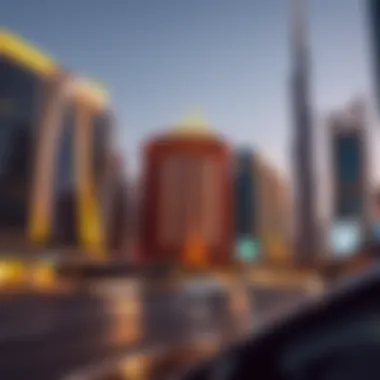

The key characteristic of Dubai's cultural institutions is their embrace of subversive contemporary art which challenges the established narratives. This approach not only attracts premier artists but also engenders a sense of global connectivity, continually enriching Dubai's cultural narrative. Furthermore, they also offer invaluable spaces for dialogue, pushing the boundary of what art can signify and inspire.
Events and Festivals
Events and festivals represent a cornerstone of Dubai’s cultural activities, providing a lively platform for both local and international artists. The Dubai Shopping Festival, for instance, showcases not only retail but also cultural performances, making it a must-visit event. The celebrations during these times intertwine traditional practices with modern influences, creating a rich spectacle that draws crowds.
The unique feature of these events is their inclusivity. They encourage participation from Dubai’s diverse population, creating shared experiences that resonate widely. This not only entertains but fosters community engagement—essential for a city molded by its citizens’ multitudes.
In summary, the Cultural Fabric of Dubai is integral to its status as a global city. The interplay between diversity, heritage preservation, and artistic expression presents a comprehensive view of how culture shapes and enhances urban life here, creating a lively, cohesive environment for residents and visitors alike.
Urban Planning and Infrastructure
Urban planning and infrastructure are not mere afterthoughts in a city like Dubai; they're the backbone that holds the vibrant urban ecosystem together. These elements play a significant role in shaping the city's economic viability, social interactions, and cultural offerings. An efficient urban infrastructure can invite investors, attract tourists, and improve the overall quality of life for residents. The strategic placement of facilities, parks, and even roads all contribute to making Dubai a prime example of a global city.
Sustainable Development Goals
The commitment of Dubai to sustainable development goals (SDGs) highlights its recognition of the need for balanced growth. These goals are more than buzzwords; they represent tangible targets aimed at improving social equity, economic growth, and environmental sustainability. For example, Dubai has actively promoted green building practices and energy efficiency through its Dubai Green Building Code, which ensures that new constructions adhere to environmental standards.
The unique aspect of Dubai’s approach lies in its ambitious project, The Sustainable City, which serves as a living blueprint for others to follow. This eco-conscious community aims to sustain a high quality of life while reducing the carbon footprint through technological innovations such as solar energy usage and water recycling systems. Thus, integrating SDGs into urban planning is not merely a choice; it's a necessity for the future.
Transportation Networks
Transportation is another essential cog in Dubai's urban machine. The way a city handles its transportation impacts everything from economic productivity to citizen happiness. A well-thought-out transportation network decreases congestion, shortens travel times, and enhances overall mobility. In Dubai, innovations in public transport and road systems are crucial in keeping the city thriving.
Public Transport Innovations
Public transport innovations in Dubai have been nothing short of revolutionary. The introduction of the Dubai Metro, which is fully automated, has changed the landscape of mass transit not just in the UAE, but globally. Its high efficiency and integrated design boost the daily travels of thousands, minimizing road congestion and air pollution.
One key characteristic of the Dubai Metro is its extensive reach, connecting the primary areas of the city. This makes it a beneficial choice for those who are commuting to work or visiting attractions. A unique feature of the Metro system is its emphasis on accessibility, with provisions such as dedicated spaces for people with disabilities and state-of-the-art safety features. Though, it is not without disadvantages, as peak times can lead to overcrowding.
Road System Optimization
On the other side of the spectrum, road system optimization serves as a crucial element of Dubai’s vision for efficient urban transport. The city has implemented smart traffic management systems that use real-time data to monitor and manage traffic flows. This not only helps improve travel efficiency but also enhances safety on the roads.
One of the standout characteristics of road system management is the innovative use of satellite technology in traffic signals, which allows for almost instantaneous adjustments based on traffic conditions. While this optimizes overall traffic flow and reduces wait times, the inherent challenge remains the need for continual infrastructure maintenance and upgrades to keep pace with rapid urban growth.
Smart City Initiatives
With a firm eye on the future, Dubai has embraced smart city initiatives aimed at enhancing urban life through technology. These initiatives encompass a range of projects, from smart renewable energy solutions to enhanced digital services for the public and businesses. Implementing intelligent systems in urban infrastructure ensures a connected environment that benefits residents, businesses, and the city at large.
For instance, initiatives such as the Smart Dubai strategy focus on making emirate a leader in tech by improving services, reducing costs, and boosting economic activity. In this context, the integration of advanced technology not only augments the efficiency of urban services but also aligns with Dubai's aspirations to be at the forefront of innovation in urban planning.
Relevant resources:
- Wikipedia: Urban Planning
- UAE Government: Sustainable Buildings
- Dubai Smart City
- World Bank: Urban Development
Impact of Global Events
The influence of global events on cities like Dubai cannot be overstated. Events such as world expositions and international competitions have the potential to shape not only the economic landscape but also the cultural identity of a city. Dubai, in particular, has effectively leveraged these events to bolster its global presence, transforming itself into a city that attracts millions of visitors and investors around the world.
World Expos and Their Significance
World Expos are not merely showcases of innovation and culture; they are powerful platforms for cities to flaunt their capabilities on a global stage. The upcoming World Expo 2025, hosted in Osaka, Japan, has already set the stage for a series of expos planned for Dubai in the near future. In hosting such high-profile events, Dubai takes center stage in fostering relationships and drawing attention from governments and corporations alike.
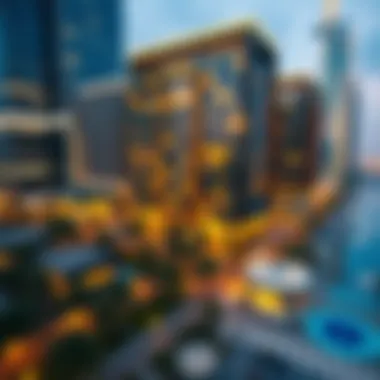

A World Expo can have profound economic impacts. For instance, according to the Bureau International des Expositions (BIE), previous expos have contributed significantly to the host city's GDP. The last World Expo, held in Dubai in 2020, is expected to bring in millions of visitors, creating jobs, enhancing tourism, and promoting trade.
"Dubai is not just planning for today; it is investing in its future through these global events. It’s a long-term vision that pays off."
Moreover, the significance of a World Expo lies not only in economic returns but also in cultural exchange and innovation. Countries display their latest technologies, arts, and history, allowing Dubai's residents and visitors to engage with a myriad of cultures.
Hosting International Competitions
International competitions further amplify Dubai's standing as a global hub. Events such as the FIFA Club World Cup and the World Athletics Championships spotlight the city’s state-of-the-art facilities and hospitality. When Dubai hosts such events, it's not just a showcase; it acts as a magnet for global media coverage, boosting the city’s brand.
These competitions help not only in promoting sports but also in driving tourism, as fans and spectators flock to the city to witness these global gatherings. As a result, businesses in hospitality, retail, and transport typically see a surge in demand.
The advantages of hosting such events can be summarized as follows:
- Economic Boost: Increased revenue from tourism and hospitality.
- Global Exposure: Enhanced international reputation.
- Cultural Exchange: Opportunities for diversity in cultural experiences.
Similarly, by embracing global events, Dubai continues to solidify its role as a forward-thinking city, demonstrating to investors, expats, and visitors alike that it is not just a dot on a map but a thriving metropolis that delivers on its promises, bridging connections across continents.
The End: The Future of Global Cities
The concept of global cities continues to evolve amidst a backdrop of significant challenges and opportunities. As urban centers like Dubai thrive, they must adapt to a myriad of factors reshaping the urban landscape—be it technological advancements, economic shifts, or pressing environmental issues. Understanding these dynamics is not just academic; it's vital for stakeholders ranging from investors to expatriates who seek to harness the potential these cities offer.
Focusing on the future of global cities allows us to consider several key elements, including social sustainability, economic resilience, and innovative governance. The implications of these elements are profound, with the potential to influence global economic strategies and urban policies. Cities that embrace adaptability and foster inclusive growth will inevitably position themselves as leaders in the global arena.
Adapting to Global Challenges
Global cities face numerous challenges that necessitate immediate and strategic responses. From economic downturns linked to shifting trade dynamics to social equity issues exacerbated by rapid urbanization, these cities must find solutions to remain competitive. For instance, as climate change poses risks to urban infrastructure, cities like Dubai are increasingly investing in renewable energy sources and sustainable planning initiatives.
Consider the following challenges:
- Climate Change: Cities need to implement strategies to mitigate the impact of rising temperatures and resource scarcity.
- Economic Diversification: Reliance on a single industry can destabilize urban economies; thus, cities must seek diverse economic portfolios.
- Social Integration: As global cities attract a mix of cultures, fostering inclusivity within different communities becomes critical.
Innovative approaches are essential in this context; for example, the use of smart technologies can enhance urban efficiency and reduce environmental impacts. Such technology can support waste management systems and energy-efficient buildings, ensuring urban growth does not come at the expense of environmental degradation.
Vision for Dubai
Dubai, as a hallmark of modern urban development, presents a unique vision for the future. The ambition to become a leader in areas such as innovation, tourism, and sustainable practices aligns with the broader objectives of global cities. Leaders in Dubai are not just reacting to trends; they are shaping them.
Key aspects of Dubai's vision include:
- Sustainable Tourism: Emphasizing environmental responsibility while attracting international visitors.
- Business Ecosystem: Fostering a dynamic environment for startups and established enterprises alike, enhancing its role as an economic powerhouse.
- Cultural Inclusivity: Promoting a multicultural society where diverse backgrounds are celebrated and integrated into the social fabric.
These aspects of Dubai's vision illustrate a commitment to adaptability and foresight in global affairs. They not only serve local communities but also set an example for other aspiring global cities.
Importance of References in This Article
- Credibility: Citing credible sources boosts the article's authority and persuades discerning readers that the arguments presented are well-informed.
- Contextualization: Through references, the dense web of Dubai’s historical context and present-day conditions can be better understood. This is particularly crucial when discussing its rapid development and how it fits into the larger global city narrative.
- Diversity of Perspectives: Utilizing various sources, be it case studies, research papers, or articles from established platforms, allows for a more nuanced view, catering to the complex dynamics of a multicultural metropolis like Dubai.
Specific Elements of References
- Academic Journals: Articles from reputable journals provide in-depth analyses and exploration of the themes covered. Works published in journals such as Journal of Urban Affairs or Urban Studies can be particularly illuminating.
- Government Reports: Documents from the United Arab Emirates’ governmental bodies often contain statistical data and insights on policies regarding urban planning, economic diversification, and international events held in Dubai. These documents bolster factual accuracy and provide a solid base for discussions.
- Comparative Case Studies: Referencing comparative analyses with other global cities enhances the understanding of what sets Dubai apart and highlights its unique challenges and advantages.
Benefits of Utilizing References
- Enhanced Discourse: Richly referenced content facilitates deeper discussions and invites further inquiry from readers, allowing them to explore topics beyond the introduction provided in the article.
- Resource for Further Learning: For readers interested in delving more into the subject, a comprehensive list of references supplies a path for additional research and exploration.
- Supporting Evidence for Claims: When discussing Dubai’s role as a global hub for business and tourism, referencing data from organizations such as the World Bank or UN-Habitat becomes vital in supporting those claims effectively.
Considerations About References
- Updating Information: Given the fast-paced nature of global cities and their continuously evolving landscapes, it’s crucial to ensure that all referenced materials are up-to-date. This means regularly checking links and sources for the most current data and insights.
- Source Variety: Ensure a blend of perspectives by including a mix of local and international sources. This variety fosters a comprehensive approach, appealing to a diverse readership.
- Citing Properly: Clear, accurate citations not only respect the original authors but also provide transparency in research. Styles such as APA or MLA may be employed depending on the context of the article.



